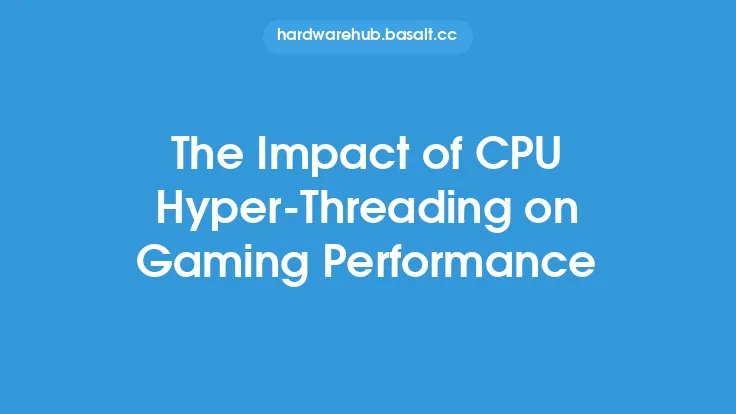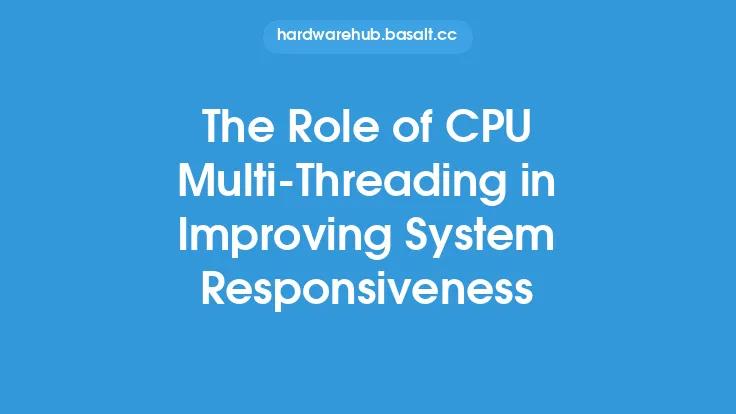The central processing unit (CPU) is a critical component of any gaming system, and its performance can significantly impact the overall gaming experience. One key feature that has become increasingly important in modern CPUs is multi-threading, which allows a single CPU core to handle multiple threads or processes simultaneously. In this article, we will delve into the impact of CPU multi-threading on gaming performance, exploring the benefits and limitations of this technology and how it affects the gaming experience.
Introduction to CPU Multi-Threading in Gaming
CPU multi-threading is a technique that enables a single CPU core to execute multiple threads or processes concurrently, improving overall system performance and responsiveness. In the context of gaming, multi-threading allows the CPU to handle multiple tasks simultaneously, such as rendering graphics, processing physics, and handling game logic. This can lead to improved frame rates, reduced latency, and a more responsive gaming experience. Modern games often take advantage of multi-threading by using multiple threads to perform tasks such as loading levels, processing AI, and handling network communications.
How CPU Multi-Threading Enhances Gaming Performance
CPU multi-threading can enhance gaming performance in several ways. Firstly, it allows the CPU to handle multiple tasks simultaneously, reducing the time spent on individual tasks and improving overall system responsiveness. This can lead to improved frame rates, as the CPU can handle tasks such as rendering graphics and processing physics more efficiently. Secondly, multi-threading can help reduce latency, as the CPU can handle tasks such as loading levels and processing AI more quickly. Finally, multi-threading can improve the overall gaming experience by allowing for more complex and detailed game worlds, as the CPU can handle more tasks simultaneously.
The Role of CPU Cores and Threads in Gaming Performance
The number of CPU cores and threads available can significantly impact gaming performance. Modern games often require multiple CPU cores to run efficiently, and having more cores and threads available can improve performance. For example, a game that uses four CPU cores to render graphics, process physics, and handle game logic can benefit from a CPU with at least four cores. Additionally, having more threads available can improve performance, as the CPU can handle more tasks simultaneously. However, it's worth noting that not all games are optimized to take advantage of multiple CPU cores and threads, and some games may not see a significant improvement in performance even with a high-core-count CPU.
The Impact of CPU Multi-Threading on Different Types of Games
The impact of CPU multi-threading on gaming performance can vary depending on the type of game. For example, games that are heavily reliant on physics and graphics processing, such as first-person shooters and action games, can benefit significantly from CPU multi-threading. These games often use multiple threads to perform tasks such as rendering graphics, processing physics, and handling game logic, and having more CPU cores and threads available can improve performance. On the other hand, games that are more focused on strategy and gameplay, such as real-time strategy games and role-playing games, may not benefit as much from CPU multi-threading. These games often rely more on the CPU's ability to handle complex calculations and decision-making, rather than raw processing power.
The Relationship Between CPU Multi-Threading and GPU Performance
The relationship between CPU multi-threading and GPU performance is complex and multifaceted. While the CPU and GPU are separate components, they work together to provide a smooth and responsive gaming experience. In general, a fast CPU with multiple cores and threads can help improve GPU performance by providing a steady stream of data to the GPU. This can help improve frame rates and reduce latency, as the GPU is not waiting for the CPU to provide data. However, if the GPU is not powerful enough to handle the data provided by the CPU, the system may become bottlenecked, and performance may suffer. Therefore, it's essential to have a balanced system with a fast CPU and a powerful GPU to take full advantage of CPU multi-threading.
Conclusion
In conclusion, CPU multi-threading can have a significant impact on gaming performance, improving frame rates, reducing latency, and providing a more responsive gaming experience. The number of CPU cores and threads available can significantly impact performance, and having more cores and threads available can improve performance. However, the impact of CPU multi-threading can vary depending on the type of game, and not all games are optimized to take advantage of multiple CPU cores and threads. Additionally, the relationship between CPU multi-threading and GPU performance is complex, and having a balanced system with a fast CPU and a powerful GPU is essential to take full advantage of CPU multi-threading. As the gaming industry continues to evolve, it's likely that CPU multi-threading will play an increasingly important role in providing a smooth and responsive gaming experience.





